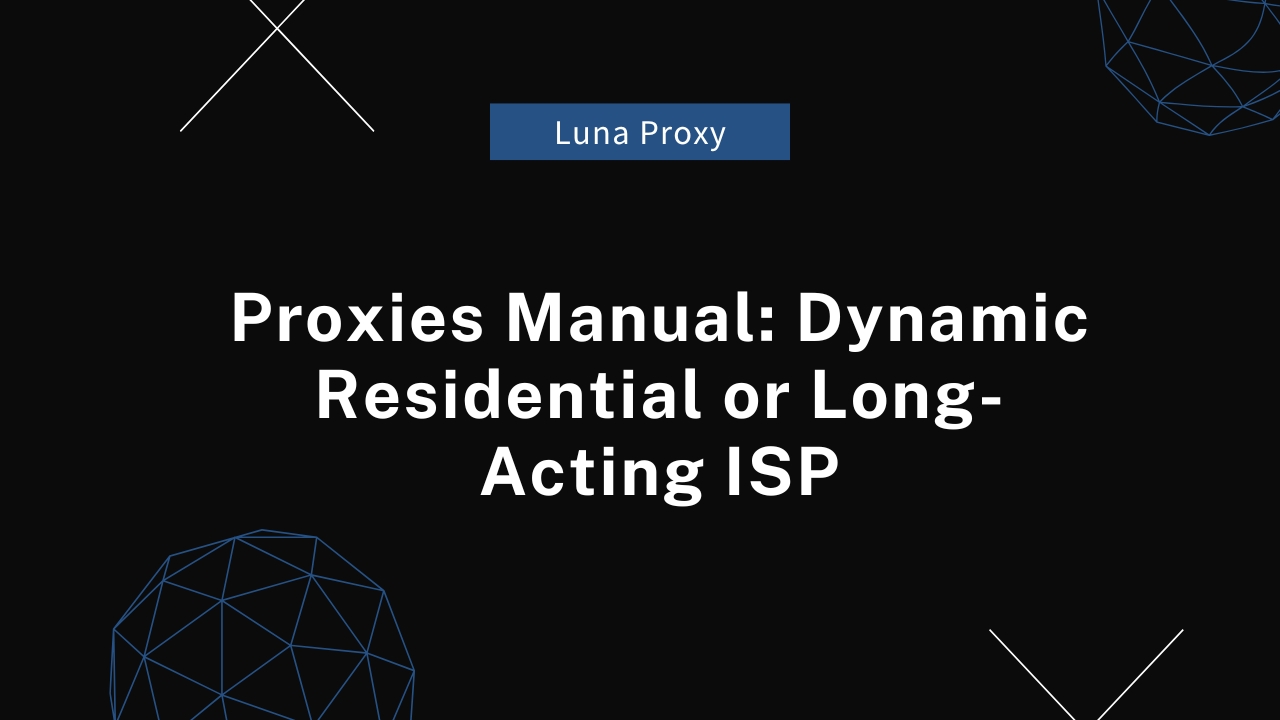
Residential Proxies added 300,000 US IP on April 9th.


AI web data scraping exclusive proxy plan [ Unlimited traffic, 100G+ bandwidth ]

 Language
Language

In the world of web scraping, security, and anonymity, proxies play an essential role in bypassing restrictions and ensuring smooth data collection. Among the various types of proxies available, two commonly discussed options are Dynamic Residential Proxies and Long-Acting ISP Proxies. Both serve distinct purposes and cater to different needs. In this article, we'll explore the characteristics, benefits, and use cases of these two types, helping users make informed decisions when choosing between them.

Dynamic Residential Proxies are IP addresses assigned to users by Internet Service Providers (ISPs), originating from real devices such as smartphones and computers. What makes them dynamic is the rotation of IP addresses. The proxy provider pools IPs from multiple sources, automatically assigning a new IP to the user after each request or a set period of time. This constant change of IPs ensures a higher degree of anonymity and makes it difficult for websites to detect and block scraping activities.
- High level of anonymity due to IP rotation.
- Suitable for large-scale web scraping and bypassing strict geo-blocking.
- Use of real residential IPs increases legitimacy.
- Due to frequent IP changes, maintaining a stable session for long tasks can be challenging.
Long-Acting ISP Proxies, also known as static residential proxies, are IP addresses provided by ISPs but with a significant difference—they remain static over extended periods. This allows users to maintain a consistent IP for as long as needed without worrying about frequent rotations. These proxies are often utilized by businesses that require stable connections for account management, advertising verification, and other tasks that demand IP consistency.
- High level of anonymity due to IP rotation.
- Suitable for large-scale web scraping and bypassing strict geo-blocking.
- Use of real residential IPs increases legitimacy.
- Due to frequent IP changes, maintaining a stable session for long tasks can be challenging.
- Offers a stable, long-term IP address.
- Ideal for tasks where IP rotation might hinder performance, such as managing multiple accounts.
- Minimizes the chances of IP-based account bans since they are residential IPs from legitimate ISPs.
- Static IPs may become more susceptible to detection if used excessively for certain tasks, making them less suitable for high-volume scraping.
The main difference between Dynamic Residential Proxies and Long-Acting ISP Proxies lies in their IP behavior—dynamic proxies rotate, while static proxies maintain a fixed IP. For tasks requiring high levels of anonymity, dynamic proxies are often preferred because they continually change, preventing long-term tracking. In contrast, for operations that require stable connections, such as social media account management or sensitive e-commerce operations, long-acting proxies provide the necessary consistency.
Moreover, dynamic proxies often suit those targeting global data collection, as IP rotation helps avoid geo-restrictions and bans. Static proxies, while less flexible in this regard, are crucial for tasks where re-authenticating IPs frequently may disrupt performance.
Choosing between Dynamic Residential Proxies and Long-Acting ISP Proxies depends on your specific needs:
- Large-scale web scraping across various regions.
- Circumventing IP bans by frequently rotating IPs.
- Anonymity-driven tasks like accessing restricted content.
- Consistent browsing sessions or managing multiple accounts.
- Advertising verification, online surveys, and market research.
- Tasks where maintaining a static IP is more important than hiding your activities behind constantly changing IPs.
Understanding your project’s technical demands will significantly guide your decision. A dynamic proxy is the best solution if your task involves avoiding detection across multiple sites. Meanwhile, if you are conducting operations that depend on long-term trust from a single IP, static proxies are your best bet.
Both Dynamic Residential Proxies and Long-Acting ISP Proxies offer unique strengths and should be used in different scenarios. Dynamic proxies provide high anonymity and flexibility, while static long-acting proxies offer stability and reliability. Ultimately, your decision should align with the nature of your task—whether it involves large-scale data gathering, anonymous browsing, or stable account management. By understanding the differences and matching them to your use case, you’ll be equipped to make the best proxy choice for your needs.
